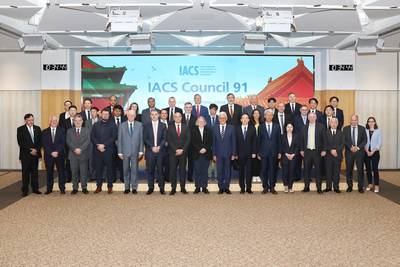IACS Highlights Progress on Digitalization and Decarbonization
The IACS Council met in Beijing last week (C91) to assess and advance the association’s progress on the safe decarbonization and digital transitions.
C91 welcomed the Safe Digital Transformation Panel’s work undertaken to clarify IACS’ role in digitalization, cyber systems and marine autonomous surface ships, and in sharing these important conceptualizations with IMO at its FAL49 meeting earlier this year in support of its comprehensive digitalization strategy.
IACS Council also highlighted the development of IACS Resolutions on a diverse range of digital issues including cybersecurity controls for existing ships, vessel asset inventory for computer-based systems, classification of complex systems which utilize computer-based systems, a protocol on format definition and exchange of 3D model, risk assessment for maritime autonomous surface ships (MASS) and communications and remote connectivity for MASS.
Three years after the launch of its Safe Decarbonisation Panel, the IACS Council welcomed the rapid progress made in developing technical guidance across a range of key technologies that support the introduction of new fuels and technologies on both new builds and the existing fleet.
In line with IACS’s technology-neutral approach, IACS instruments now cover ammonia, methanol, hydrogen, batteries and carbon capture, while also working with flag States on matters such as gas dispersion analysis and risk assessments for alternative fuels as required by the IGF code. The Council also welcomed IACS’ preliminary work in assessing its potential role in the introduction of nuclear technologies.
Additionally, the further development of the Common Structural Rules (CSR) was discussed at C91, where the council reviewed the input received from the extensive and ongoing consultation exercise that is being undertaken with industry. C91 noted the intensive efforts that had been made to provide additional, detailed technical background data and explanations to the many and varied questions raised.
Council further recognized that it was incumbent on IACS to demonstrate to all stakeholders that the revised CSR would deliver the same or greater level of safety as the current rules. C91 noted that providing this level of confidence would best be achieved by finalizing the consequence assessment based on a list of suitable vessels that represented a good proportion of the oil tanker and bulk carrier fleets.
Reaffirming its commitment to working with industry throughout the CSR review process, Council noted that allowing industry adequate time to comment on the results of the Consequence Assessments meant that the previously announced timetable for adoption of the new CSR should now be considered as indicative only, and this would be kept under active review pending further feedback.
On other matters at C91, IACS Council discussed integrating ESG principles into the governance of the association. Recognizing that many IACS Members have their own ESG policies, C91 agreed that in developing these principles, they would apply to the activities IACS undertakes as an association and their objectives would need to be closely integrated to IACS’ core mission of safety and environmental protection.















